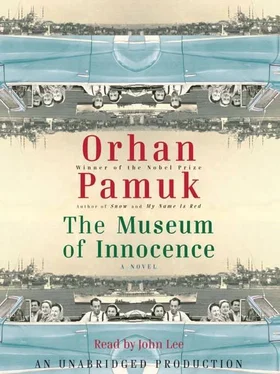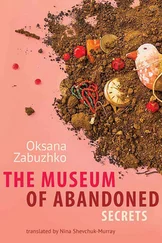“I’m very happy for you!” he said. “And he’s handsome! Congratulations, my boy,” he said, and he shook my hand.
Sibel’s girlfriends, all smiles, came to join us. The former foreign minister took on the air of a playboy, heaping extravagant praise on them for their dresses, their jewelry, and their upswept hair, in that tongue-in-cheek way that is the preserve of indulged old men, and when he had kissed each one on the cheek he went downstairs, as if never more pleased with himself.
“I’ve never liked that bastard,” said my father, heading down the stairs.
“For God’s sake, let it go!” said my mother. “Watch the steps.”
“I can see them,” said my father. “I’m not blind yet, thank God.” When he saw the view from the garden- Dolmabahçe Palace and beyond it the Bosphorus, Üsküdar, and Leander’s Tower-and the crowd of chattering guests, he cheered up. I took him by the arm, and as we walked among the waiters offering colorful canapés, we began the long process of greeting our guests, offering each kisses on the cheek and a suitable interval of small talk.
“How proud you must be of your son, Mümtaz Bey. He’s the spitting image of you at that age… I feel as if I’m looking at you when you were young.”
“I’m still young, madam,” said my father. “But I’m afraid I don’t recognize you…” Then he turned to me. “Would you mind letting go of me?” he whispered sweetly. “You’re holding my arm too tight and I’m not lame.”
I discreetly extracted myself. The garden sparkled with beautiful girls. Most were wearing stylish open-toed high heels, and I imagined the expectant and joyful care with which they must have painted their toenails fire engine red. Though they were in sleeveless or backless dresses with plunging necklines, it cheered me to see how much more at ease they were in this fashion than they were in their usual short skirts. Just like Sibel, they were clutching small shimmering handbags with metal clasps.
Sometime later Sibel took me by the hand and introduced me to a large number of relatives, childhood friends, classmates, and other chums I’d never heard of.
“Kemal, I’d like to introduce you to a very dear friend of mine,” she said each and every time, her face beaming, and she would go on to praise that person in a voice that, for all its joyous sincerity, still carried the weight of obligation. The joy was most certainly the effect of life having gone her way, exactly the way she planned. She had devoted such an effort to the perfect placement of every pearl on her dress, made sure every crimp and curl was in impeccable harmony with every curve on her body, and now with the evening proceeding so smoothly, she assumed that she could just as smoothly slip into a happy future. This was why Sibel treated each passing moment, each new face, each embrace, as a fresh cause for jubilation. From time to time she would nestle up to me, and with maternal attentiveness she would use her thumb and her forefinger to pick off an imaginary hair or piece of lint from my shoulders.
Whenever there was a pause in the greeting and joking, I raised my head to survey the guests and the waiters carrying trays of canapés among them and I could tell from the level of laughter and chatter that the drinks were beginning to relax them. All the women were lavishly made up and extravagantly dressed. In their filmy, tight-waisted, sleeveless dresses, they looked as if they would soon be feeling the chill, while the men seemed trussed up in their stylish white suits, buttoned up as tightly as boys in their outgrown holiday best-and ties that were colorful by Turkish standards, aping the wide, loud, patterned “hippie” ties so fashionable three or four years earlier. It was clear that many rich, middle-aged men had either not heard or refused to believe that the rage for big sideburns, Cuban heels, and long hair had finally run its course. The effect of these overlong and now outdated sideburns, kept in deference to fashion, together with the more traditional black mustaches, was to make the men’s faces look very dark. As the smells of aftershave and brilliantine (applied with particular liberality on the thinning hair of men over forty), the ladies’ heavy perfumes, the clouds of cigarette smoke to which everyone contributed, more out of habit than for pleasure, the odor of cooking oil from the kitchens-as the confluence of odors swirled into the spring breeze, I was reminded of being a child at my parents’ parties. Even the elevator music that the orchestra (the Silver Leaves) was playing, half ironically, to set the mood for the evening, whispered to me that I was happy.
By now the guests, especially the elderly, had tired of standing, and hungry people were already looking for their tables, with little children forging ahead (“Granny! I found our place!” “Where? Stop, don’t run, you’ll fall”). Just then, the former foreign minister came up from behind to take me by the arm. With consummate diplomatic skill he drew me to one side to remind me that he had known Sibel since she was a child, and to impress on me, at great length, how elegant and refined she was, and what charming, cultured people her parents were, illustrating these points with examples from his own fond memories.
“Old, sophisticated families like theirs are in short supply these days, Kemal Bey,” he said. “You are in the world of business, so you know better than I do that we’re being swamped by ill-mannered nouveaux riches, and provincials with their headscarf-wearing wives and daughters. Just the other day I saw a man with two wives trailing him, draped in black from head to toe, like Arabs. He’d taken them out for ice cream to Beyoğlu… So tell me, are you ready to marry this girl and do everything to make her happy for the rest of your life?”
“Yes, sir, I am,” I said. I could not help noticing that the former minister was disappointed by the lack of jolliness in my reply.
“Engagements are not to be broken. It means that this girl’s name will be linked with yours until the end of your lives. Have you given this serious thought?”
The guests were already pouring in and forming a circle around us.
“I have.”
“Well then, let’s get you engaged so that we can eat. If you would take your place…”
I could tell he hadn’t warmed to me, but that did not dampen my mood. The former foreign minister began by telling the assembled guests a story from his army days. He, like Turkey itself, had been very poor forty years ago, and he recounted, with genuine feeling, how he and his dear departed wife had become engaged without fanfare or ceremony. He declared his high regard for Sibel and her family. There wasn’t much wit in what he said, but even the waiters who had retired to the side holding their trays smiled as if listening to an entertaining story. When Hülya, the sweet, bucktoothed ten-year-old whom Sibel loved dearly (and who was utterly fascinated by her), came forward with the silver tray bearing the rings I display here, the crowd fell silent. Sibel and I were so excited, and the former foreign minister so distracted, that we got into a hopeless muddle about which ring went where. But by now the guests were ready for a laugh, and so when a few people cried out, “Not that finger, it goes on the other hand,” a general titter circulated through the crowd, until the rings finally found their proper places, and then the former foreign minister cut the ribbon binding them, to a spontaneous round of applause sounding like a flock of pigeons taking flight. Even though I had prepared myself for this, the sight of so many people I had known all my life clapping for us and warmly smiling made me as giddy as a child. But this was not what set my heart racing.
For in the back of the crowd, standing next to her mother and father, I’d seen Füsun. A rapturous wave washed over me. As I kissed Sibel’s cheeks, as my mother came to our side and I embraced her, and then my father, and my brother, I realized what it was that had made me so joyful, though I still thought I could hide it, not just from the crowd, but from myself, too. Our table was right on the edge of the dance floor. Just before we sat down I saw Füsun sitting with her parents at the very back, right next to the table for the Satsat employees.
Читать дальше












